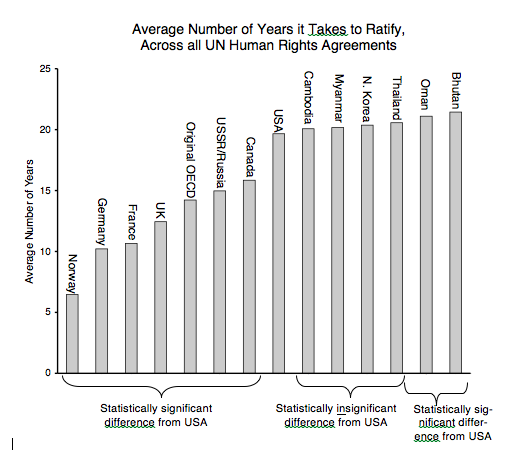Is the US exceptional when it comes to international human rights agreements?

George Washington famously warned a young America to "steer clear of permanent alliances with any portion of the foreign world." Thomas Jefferson, while encouraging "peace, commerce, and honest friendship with all nations," also promoted "entangling alliances with none." But much later, Woodrow Wilson argued in favor of engagement, stating, "We are participants, whether we would or not, in the life of the world.... We are partners with the rest. What affects mankind is inevitably our affair."
Setting aside the murky "who's right" question, I'm interested in a (somewhat) simpler one here: when it comes to human rights agreements (HRAs), is the US exceptional? By that, I mean: is it more (or less) active in the legal regime than other similar countries? The figure below presents a very simple take.
Setting aside the murky "who's right" question, I'm interested in a (somewhat) simpler one here: when it comes to human rights agreements (HRAs), is the US exceptional? By that, I mean: is it more (or less) active in the legal regime than other similar countries? The figure below presents a very simple take.
The punchline? The US is definitely exceptional in comparison to most of its "Western" peers -- countries like the UK, France, and other OECD members -- with similar civil and political rights backgrounds. Indeed, the US's HRA ratification behavior is more like that of Cambodia, Myanmar, and even North Korea! Of course, the real question is: why? There are many things that make the US unique: its high bar for ratification, its superpower status during the development of the international human rights regime, its history of exporting human rights norms while simultaneously insisting that its own rights practices are a domestic matter. The US's ratification behavior also tells us little about whether it is a force for good in the human rights arena.
For the record. I'm American. I'm not always proud of the human rights situation in the US; nor do I always support US government actions in the name of human rights abroad. But I am proud to be from a country where we struggle over rights -- which rights should prevail when they are in conflict, what role our institutions should play in their protections, how far we push them around the world.
For the record. I'm American. I'm not always proud of the human rights situation in the US; nor do I always support US government actions in the name of human rights abroad. But I am proud to be from a country where we struggle over rights -- which rights should prevail when they are in conflict, what role our institutions should play in their protections, how far we push them around the world.

